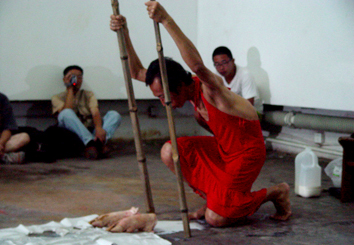Lee Wen
The Rite of Spring (Le Sacre du Printemps)
play video >


performance: duration 35 mins; video documentation above – 36 mins 15 secs
From the original Festival website:
Stricken with early stages of Parkinson’s disease, Lee continues to explore ways of expanding performance art strategies. Marking a courageous new direction Lee reinterprets Igor Stravinsky’s once controversial ballet Rite of Spring first conceived a century ago.
“Spring begets expectations of changes. It is in the air, the oceans, terra firma and life organisms; in creatures like us. I languidly brazen out that I have a sick body. And so does the earth, the society, and the world. The discoveries of remedies for incurable diseases are confronted with unheard ailments, bugs and viruses, endless conflicts that seem to escalate just when resolution is close at hand, the backlash of rigid bigoted fundamentals recall and stunt the growth of our liberated spirits, relieves us not the Sisyphean task this human existence. I accept it and reject it. I ignore it and deal with it. For changes will not come without challenge and resistance.
So I have the will to dance, to activate, to perform the body in sickness, in its primitive urgings, in perennial refutation of tyrannical status quos and repressive fates, seeking resolution of conflicts to mollify the inconsistencies for the reconciliation of contradictions that is yet to be.”
Lee Wen lives between Singapore and Tokyo. He has been exploring different strategies of time-based and performance art since 1989. His work has been strongly motivated by social investigations as well as inner psychological directions using art to interrogate stereotypical perceptions of culture and society. He seeks possibilities of collaborations, networks and dialogical discourses. He has made a strong contribution to The Artists Village alternative in Singapore and had been participating in Black Market International performance collective. He initiated and organised The Future of Imagination, an international performance art event in Singapore. He has never been to Mongolia.
Supported by the National Arts Council, Singapore.
leewen.republicofdaydreams.com
Update March 2019:
from Asia Art Archive 5th March 2019
In Memory of Lee Wen
The performance artist Lee Wen passed away on 3 March 2019, in Singapore, after having suffered from Parkinson’s Disease. He was a pioneer who defined and shaped performance art in Asia. He came of age at a time when Singapore was undergoing the turbulent and uncertain processes of nation-building—from a former British colony to a brief federation that formed Malaysia, and then rapid modernisation as a republic. Together with some of his peers, Lee reimagined the foundations of academic art, opening its vocabulary and techniques to a socially engaged practice.
Born in 1957, he was the youngest of five children raised by a single mother, Lee Mee Lan, after his father, the writer Lee Xue Min, passed away. Upon graduating from Raffles Institution in Singapore, Lee worked at various jobs, including as a bank officer for Chase Manhattan Bank. He quit after six years at the bank, and in 1987 enrolled at LASALLE College of the Arts in Singapore. In 1989 he joined The Artists Village (TAV) founded by Tang Da Wu. He thrived with peers in an environment that fostered conversation and work that was ephemeral, time-based, process-focused, and collectively and socially informed. A year after joining TAV, Lee studied at City College of London Polytechnic from 1990 to 1992, and later finished his Master of Fine Arts at LASALLE in 2006.
During his time in London, Lee often was mistaken as someone from Mainland China. This accentuated his questions about his identity and the purpose of art: his father had been a well-known writer in the Chinese literary community in Singapore, but Lee Wen felt more comfortable in English, having been educated in a system borne of British colonialism. Subjected to the homogenising gaze of Orientalism, Lee embarked on a series of projects that developed alter egos he could use to address socially constructed ideas. The first of these projects is Journey of a Yellow Man. Developed for fifteen iterations (No.7, No.8, No.10, No.12, and No.14 were planned but never executed) from 1992 to 2001, Yellow Man traveled to England, Singapore, India, Japan, Thailand, Mexico, Australia, and China. The project evolved from a critique of Orientalism to a meditation on freedom, climate change, humility, and religious practices responding to the locations in which Lee performed. Other performances – including Ghost Stories (1992-2003), Anthropometry Revision (2008), Strange Fruit (2003), World Class Society (1999-2000), and Ping Pong Go Round (1998 and 2012) –embodied rewritings of histories and conventions.
Parallel to his practice as a solo artist, Lee was active in artist-run initiatives – in particular the collective Black Market International, and the festivals Future of Imagination (FOI) and Rooted In The Ephemeral Speak (R.I.T.E.S.). He co-founded FOI in 2003, to test the Singapore National Arts Council’s loosening of its ten-year de facto ban on funding for performance art. He also co-founded R.I.T.E.S. in 2009, as a platform that explores sound as a part of performance and visual art. Throughout his practice, Lee questioned the purpose and possibilities of using the body as material, and the relevance of art – in particular performance art –for the issues of its time.
Aside from showing his work at The Artists Village, he published A Waking Dream (1981), a book of his sketches accompanied by texts, and also had solo exhibitions at Singapore Art Museum, The Substation, and elsewhere. Notable group exhibitions included SunShower at The National Art Center, Tokyo, and Mori Art Museum (2017); Secret Archipelago at Palais de Tokyo (2015); Singapore Biennale (2013); Asiatopia (2008, 1998); Third Asia Pacific Triennial (1999); Sexta Bienal de La Habana (1997); and Kwangju Biennale (1995). His work is in the collections of Singapore Art Museum, Fukuoka Asian Art Museum, Queensland Art Gallery, and Mori Art Museum, among others. He was awarded the Joseph Balestier Award for the Freedom of Art in 2016, the Artist Scholar Activist Award from Performance Studies international in 2014, and Singapore’s Cultural Medallion in 2005.
View the Lee Wen Archive: aaa.org.hk/en/collection/search/archive/lee-wen-archive
